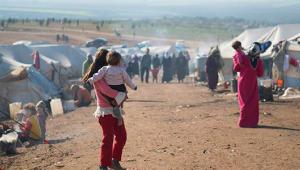The report by the United Nations High Commissioner for Refugees and the World Bank outlines the “colossal” human, economic and social costs for the 1.7 million Syrian refugees living in neighbouring Jordan and Lebanon and their host communities.
“The plight of refugees is dire and the lives and dignity of millions is at stake,” said Hafez M.H. Ghanem, vice president of the World Bank’s Middle East and North Africa Region, noting that the effects of the crisis have spilled over into Europe and beyond as desperate refugees seek better lives.
The report, The Welfare of Syrian Refugees: Evidence from Jordan and Lebanon, offers a snapshot in 2014 of who the refugees are and their welfare.
More than half are women, and compared to the pre-crisis population in Syria they are younger and more likely to be single.
The report said that poverty among them is widespread, with higher rates among bigger families, and expected to worsen. They are also vulnerable to shocks from lack of money and food, have few legal rights and face constrained access to services due to unprecedented demand.
Despite the overwhelmingly young population, their needs in terms of schooling, training and health care are not being met and the long-term developmental benefits of these are being missed.
Less than half of the school-aged children living in Jordan are currently enrolled in schools and those who are face low-quality education, meaning human capital among the population is deteriorating.
The vast majority of refugees also live on the fringes of society, largely in informal settlements in urban or peri-urban settlements rather than in refugee camps.
Kelly Clements, the UN deputy high commissioner for refugees, said the report presents “a sobering analysis of the profound poverty of Syrian refugees who have endured shock after shock”.
“There situation will only worsen unless there is a dramatic change in opportunity for them to support their own self reliance and contribute to local economies. Bringing these insights to policymakers will help design longer-term programmes, combining humanitarian and development resources.”
The report suggests widening the focus of crisis mitigation to economic inclusion, which it said should become a critical part of the growth and development strategy for host communities.
Short-term cash and food assistance programmes should also be paired with medium- and long-term policies and programmes that allow refugees and host communities alike to benefit, it said.
Ghanem added that responding to the humanitarian and development crises in the Middle East is a “collective responsibility” and that the world should act on their immediate consequences as well as on the underlying causes of conflict.
“We should spare no efforts to put the MENA region on the path of stability, peace and prosperity for all,” he said.













